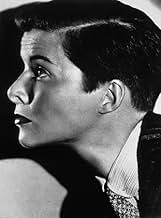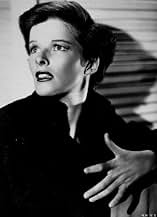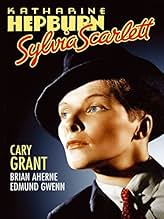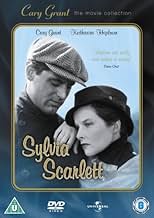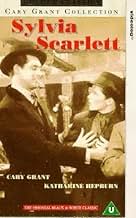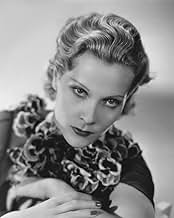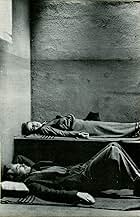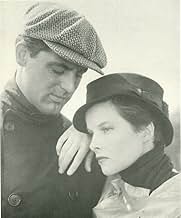IMDb-BEWERTUNG
6,2/10
4786
IHRE BEWERTUNG
Füge eine Handlung in deiner Sprache hinzuWhen her father decides to flee to England, young Sylvia Scarlett must become Sylvester Scarlett and protect her father every step of the way, with the questionable help of plenty others.When her father decides to flee to England, young Sylvia Scarlett must become Sylvester Scarlett and protect her father every step of the way, with the questionable help of plenty others.When her father decides to flee to England, young Sylvia Scarlett must become Sylvester Scarlett and protect her father every step of the way, with the questionable help of plenty others.
- Auszeichnungen
- 1 wins total
Robert Adair
- Turnkey
- (Nicht genannt)
Bunny Beatty
- Maid
- (Nicht genannt)
May Beatty
- Older Woman on Ship
- (Nicht genannt)
Daisy Belmore
- Fat Woman on Beach
- (Nicht genannt)
Carmen Beretta
- Woman
- (Nicht genannt)
Nina Borget
- Minor Role
- (Nicht genannt)
Thomas Braidon
- Minor Role
- (Nicht genannt)
Elsa Buchanan
- Minor Role
- (Nicht genannt)
Colin Campbell
- Minor Role
- (Nicht genannt)
James Carlisle
- Park Scam Onlooker
- (Nicht genannt)
Patricia Caron
- Minor Role
- (Nicht genannt)
Harold Cheevers
- Bobby
- (Nicht genannt)
E.E. Clive
- Customs Inspector
- (Nicht genannt)
Edward Cooper
- Customs Inspector
- (Nicht genannt)
Empfohlene Bewertungen
An extremely unusual little film from director George Cukor makes the odd transition from caper comedy to coming of age romance - and occasionally teeters back and forth between the two. The film was a massive flop at the box office (in order to make amends for the film's failure, Cukor and star Katharine Hepburn reportedly offered to make their next film for free), and the audiences of thirties just didn't seem to understand film's bizarre juxtaposition between gritty depression-era realism and dreamy Hollywood surrealism. In all truth, however, the film is enormously entertaining when viewed today, and its unusual tone will be better appreciated by modern audiences.
Although this is the performance that led her to be labeled by critics and theater owners as "box office poison," Hepburn is delightful in role that was quite offbeat for the time (this was 48 years before Barbra Streisand donned male drag in YENTL). Brian Aherne also delivers an endearingly off-kilter performance as Sylvia's love interest, and Edmund Gwenn is terrific in the difficult role of Sylvia's father, who must balance humor and pathos at regular intervals. Best of all is Cary Grant who flat-out nails his role as a cockney con man, and simply radiates with wit, sex appeal, and macho charisma. He alone would make the film worth watching, but, on the whole, SYLVIA SCARLETT remains a lost gem that was very much ahead of its time.
Although this is the performance that led her to be labeled by critics and theater owners as "box office poison," Hepburn is delightful in role that was quite offbeat for the time (this was 48 years before Barbra Streisand donned male drag in YENTL). Brian Aherne also delivers an endearingly off-kilter performance as Sylvia's love interest, and Edmund Gwenn is terrific in the difficult role of Sylvia's father, who must balance humor and pathos at regular intervals. Best of all is Cary Grant who flat-out nails his role as a cockney con man, and simply radiates with wit, sex appeal, and macho charisma. He alone would make the film worth watching, but, on the whole, SYLVIA SCARLETT remains a lost gem that was very much ahead of its time.
Androgeny is a quality that some of the biggest of our great stars possessed: Garbo, Dietrich, Grant, Vanessa Redgrave, to name a few, and of course, Katharine Hepburn. In "Sylvia Scarlett," she plays a young woman masquerading as a young man for part of this rather strange film that can't make up its mind what it is. The movie also stars Cary Grant, Edmund Gwenn and Brian Aherne. Gwenn is Henry Scarlett, an embezzler who has to high-tail it out of England fast. When his daughter Sylvia insists on going along, he tells her everyone will be looking for him with his daughter, so Sylvia becomes Sylvester by cutting his hair and donning mens' clothes.
On the boat, the two meet Jimmy Monckley, a con man, and eventually team up with him for a series of cons. Then a flirtatious maid friend of Jimmy's joins them and they become vaudevillians in one of the film's more bizarre twists. Henry, a widower, marries said maid and winds up obsessive and jealous (with, one suspects, good reason since she makes a pass at Sylvia as Sylvester). One night at a performance, the cast meets an artist, Michael Fane, whom Sylvia falls for, and she ultimately reveals himself to him as a woman.
The plot of this film changes more than the sexes, with Hepburn inexplicably staying a boy once she and her father have made their escape to France. There are some great scenes - the con in the French park, with Sylvia pretending to be a destitute boy who can't speak English, and the scene where the dress she stole on the beach so she could make her big reveal to Michael is recognized by the owner. Also, the act they perform is amusing. It probably would have been better to stick with the con angle and have the script go from there, but it goes from that to the performance angle to a love triangle etc.
Katharine Hepburn makes both an excellent boy and young woman in the throes of first love, and Cary Grant has an early, uncharacteristic role as an absolute thief and heel who is also somewhat abusive. His persona would change, and he would find it difficult to convince anyone later on to let him go back to this type of character who is not redeemed at the end. But his good looks and charm make him a natural rogue. The underrated Brian Aherne, who it appears wound up taking a back seat to Errol Flynn, is marvelous as Michael. He's romantic, sexy, and gives the role a light touch.
Directed by George Cukor, "Sulvia Scarlett" is a dizzy film that's not a wild comedy (which it probably should have been) or a drama or a love story. It's remembered today for Hepburn's cross-dressing. A shame, because it could have been remembered for more than that.
On the boat, the two meet Jimmy Monckley, a con man, and eventually team up with him for a series of cons. Then a flirtatious maid friend of Jimmy's joins them and they become vaudevillians in one of the film's more bizarre twists. Henry, a widower, marries said maid and winds up obsessive and jealous (with, one suspects, good reason since she makes a pass at Sylvia as Sylvester). One night at a performance, the cast meets an artist, Michael Fane, whom Sylvia falls for, and she ultimately reveals himself to him as a woman.
The plot of this film changes more than the sexes, with Hepburn inexplicably staying a boy once she and her father have made their escape to France. There are some great scenes - the con in the French park, with Sylvia pretending to be a destitute boy who can't speak English, and the scene where the dress she stole on the beach so she could make her big reveal to Michael is recognized by the owner. Also, the act they perform is amusing. It probably would have been better to stick with the con angle and have the script go from there, but it goes from that to the performance angle to a love triangle etc.
Katharine Hepburn makes both an excellent boy and young woman in the throes of first love, and Cary Grant has an early, uncharacteristic role as an absolute thief and heel who is also somewhat abusive. His persona would change, and he would find it difficult to convince anyone later on to let him go back to this type of character who is not redeemed at the end. But his good looks and charm make him a natural rogue. The underrated Brian Aherne, who it appears wound up taking a back seat to Errol Flynn, is marvelous as Michael. He's romantic, sexy, and gives the role a light touch.
Directed by George Cukor, "Sulvia Scarlett" is a dizzy film that's not a wild comedy (which it probably should have been) or a drama or a love story. It's remembered today for Hepburn's cross-dressing. A shame, because it could have been remembered for more than that.
SYLVIA SCARLETT (RKO Radio, 1935/released early January 1936), directed by George Cukor, and starring Katharine Hepburn, Cary Grant and Brian Aherne, is a movie that was somewhat ahead of its time. In the early 1970s during the so-called "nostalgia boom" era, I kept hearing about this being the worst Katharine Hepburn movie ever made. Because of that reputation, I became curious. Could it really be that bad? In a TV documentary about classic movies I saw many years ago, Hepburn was interviewed and said the majority of the theater patrons walked out long before the movie was over. Today it has gained a reputation as a "camp classic." Well, I finally got to watch this curious item for the first time on public television's WNET, Channel 13, in New York City in 1977 as part of the Katharine Hepburn Film Festival, which aired every Saturday night. After watching it, I kept wondering if this was supposed to be a comedy or drama. I guess a combination of both.
As for the plot, which opens in Paris, Henry Scarlett (Edmund Gwenn) commits larceny and takes off aboard ship with his daughter, Sylvia (Hepburn). To put the authorities off the track, she decides to cut her long hair and accompany him disguised as Scarlett's son, "Sylvester." They later meet up with a fast-talking swindler named Jimmy Monkley (Cary Grant) and travel with him around England like gypsies, making some easy money by cheating the public. Later, Sylvia, still disguised as Sylvester, encounters Michael Fane (Brian Aherne), an artist, and becomes interested in him, to later abandon her disguise to win him over.
Of the entire cast, Cary Grant comes off best in a very offbeat role, cockney accent and all, thus stealing every scene he's in. He even gets the closing shot sitting in a train compartment laughing himself silly after looking out the window and seeing Sylvia running off with Michael. Also in the cast are Natalie Paley as Lily, a Russian adventuress who tries to nab Henry Scarlett for herself, causing tragedy for him; and Dennie Moore as a daffy servant girl.
In spite of its reputation, SYLVIA SCARLETT is more interesting to see today because of the premise of a woman masquerading as a man/boy which pre-dates the more recent, VICTOR/VICTORIA (1982) with Julie Andrews. But let's not forget the 1933 MGM drama, QUEEN Christina in which Greta Garbo's character is mistaken for a young lad by an ambassador from Spain (John Gilbert), but at least that masquerade didn't go on for the entire movie. Unfortunately, Hepburn's version is an idea that might have looked good on paper, but not on screen. She does make a convincing boy, so to speak, in spite of her height, but I wonder how she felt about it years after it was made. A box office bomb at the time of its release, Hepburn and Grant did get to work together in screen again in three more comedies, BRINGING UP BABY (RKO, 1938), HOLIDAY (Columbia, 1938) and THE PHILADELPHIA STORY (MGM, 1940). SYLVIA SCARLETT, which formerly played on American Movie Classics prior to 2000, can be seen on Turner Classic Movies, or as a video/DVD rental. (**1/2)
As for the plot, which opens in Paris, Henry Scarlett (Edmund Gwenn) commits larceny and takes off aboard ship with his daughter, Sylvia (Hepburn). To put the authorities off the track, she decides to cut her long hair and accompany him disguised as Scarlett's son, "Sylvester." They later meet up with a fast-talking swindler named Jimmy Monkley (Cary Grant) and travel with him around England like gypsies, making some easy money by cheating the public. Later, Sylvia, still disguised as Sylvester, encounters Michael Fane (Brian Aherne), an artist, and becomes interested in him, to later abandon her disguise to win him over.
Of the entire cast, Cary Grant comes off best in a very offbeat role, cockney accent and all, thus stealing every scene he's in. He even gets the closing shot sitting in a train compartment laughing himself silly after looking out the window and seeing Sylvia running off with Michael. Also in the cast are Natalie Paley as Lily, a Russian adventuress who tries to nab Henry Scarlett for herself, causing tragedy for him; and Dennie Moore as a daffy servant girl.
In spite of its reputation, SYLVIA SCARLETT is more interesting to see today because of the premise of a woman masquerading as a man/boy which pre-dates the more recent, VICTOR/VICTORIA (1982) with Julie Andrews. But let's not forget the 1933 MGM drama, QUEEN Christina in which Greta Garbo's character is mistaken for a young lad by an ambassador from Spain (John Gilbert), but at least that masquerade didn't go on for the entire movie. Unfortunately, Hepburn's version is an idea that might have looked good on paper, but not on screen. She does make a convincing boy, so to speak, in spite of her height, but I wonder how she felt about it years after it was made. A box office bomb at the time of its release, Hepburn and Grant did get to work together in screen again in three more comedies, BRINGING UP BABY (RKO, 1938), HOLIDAY (Columbia, 1938) and THE PHILADELPHIA STORY (MGM, 1940). SYLVIA SCARLETT, which formerly played on American Movie Classics prior to 2000, can be seen on Turner Classic Movies, or as a video/DVD rental. (**1/2)
"Sylvia Scarlett" is like a screwball comedy that can't commit to being a screwball comedy.
Hepburn spends much of the first part of the film disguised as a boy so that she and her father (Edmund Gwenn), who are on the lam because of Gwenn's gambling debts, will be less conspicuous. They meet up with a Cockney shyster played by Cary Grant, who falls for Hepburn once he realizes she's actually a girl. Brian Aherne, playing a handsome gentleman the three come across during their travels, falls for her too. The finale involves a zany chase in which Hepburn and Aherne take off after Grant and Aherne's girlfriend in an attempt to get them back, only to discover once they've set off that they really like each other and don't much care about finding the disloyal lovers.
The fact that the film takes on gender issues at ALL makes it a curio worthy of interest, but just WHAT the film wants to do with those gender issues is never clear. Hepburn plays the character like a tomboy who's uncomfortable in her feminine skin, which is completely at odds with the girly girl she portrays in the film's very first scene. The film is never especially funny, but its overall tone is too lighthearted for the dramatic moments to make much of an impact. The editing is ragged and jumpy, which makes me wonder if the studio did some injudicious hacking, leaving elements that that would have made the film make more sense on the cutting room floor.
Critics and audiences have largely dismissed this film with an indifferent shrug, and I can't say that I blame them.
Grade: C
Hepburn spends much of the first part of the film disguised as a boy so that she and her father (Edmund Gwenn), who are on the lam because of Gwenn's gambling debts, will be less conspicuous. They meet up with a Cockney shyster played by Cary Grant, who falls for Hepburn once he realizes she's actually a girl. Brian Aherne, playing a handsome gentleman the three come across during their travels, falls for her too. The finale involves a zany chase in which Hepburn and Aherne take off after Grant and Aherne's girlfriend in an attempt to get them back, only to discover once they've set off that they really like each other and don't much care about finding the disloyal lovers.
The fact that the film takes on gender issues at ALL makes it a curio worthy of interest, but just WHAT the film wants to do with those gender issues is never clear. Hepburn plays the character like a tomboy who's uncomfortable in her feminine skin, which is completely at odds with the girly girl she portrays in the film's very first scene. The film is never especially funny, but its overall tone is too lighthearted for the dramatic moments to make much of an impact. The editing is ragged and jumpy, which makes me wonder if the studio did some injudicious hacking, leaving elements that that would have made the film make more sense on the cutting room floor.
Critics and audiences have largely dismissed this film with an indifferent shrug, and I can't say that I blame them.
Grade: C
What a waste of talent due to a muddled script and some limp direction from George Cukor. Here we have KATHARINE HEPBURN (playing a boy, Sylvester, long before Streisand played Yentl!), CARY GRANT as a strolling player with a Cockney accent and BRIAN AHERNE as an unbelievably gullible artist bewitched by Hepburn.
None of the stars are at their peak here, perhaps unable to rise above a mediocre and baffling script. Hepburn, even with her slim frame and narrow face, never is believable as a young man and the masquerade is something we're forced to believe could have happened.
EDMUND GWENN is her n'er-do-well father who has to take to the road after he's accused of a crime, and Hepburn assumes a disguise as a boy so as to avoid capture. They join a traveling road show with CARY GRANT in charge, and from then on the plot takes a series of twists and turns involving BRIAN AHERNE and his eventual interest in Sylvia when she assumes her female counterpart. It's a cross-dressing tale best forgotten if you want to keep remembering Hepburn as a legendary star.
CARY GRANT is the only one who comes off at least believable in his Cockney role, but no one is really given material worthy of their talent and George Cukor has been unable to make anything out of the awkward script. Hepburn is simply embarrassing to watch.
Summing up: This offbeat comedy was obviously intended to be a charming romp for its three stars rather than the box-office flop that it was, to the extent that Hepburn was labeled "box-office poison" on the strength of this particular film.
A look at this film must have convinced David O. Selznick why Hepburn was never seriously considered for Scarlett O'Hara.
None of the stars are at their peak here, perhaps unable to rise above a mediocre and baffling script. Hepburn, even with her slim frame and narrow face, never is believable as a young man and the masquerade is something we're forced to believe could have happened.
EDMUND GWENN is her n'er-do-well father who has to take to the road after he's accused of a crime, and Hepburn assumes a disguise as a boy so as to avoid capture. They join a traveling road show with CARY GRANT in charge, and from then on the plot takes a series of twists and turns involving BRIAN AHERNE and his eventual interest in Sylvia when she assumes her female counterpart. It's a cross-dressing tale best forgotten if you want to keep remembering Hepburn as a legendary star.
CARY GRANT is the only one who comes off at least believable in his Cockney role, but no one is really given material worthy of their talent and George Cukor has been unable to make anything out of the awkward script. Hepburn is simply embarrassing to watch.
Summing up: This offbeat comedy was obviously intended to be a charming romp for its three stars rather than the box-office flop that it was, to the extent that Hepburn was labeled "box-office poison" on the strength of this particular film.
A look at this film must have convinced David O. Selznick why Hepburn was never seriously considered for Scarlett O'Hara.
Wusstest du schon
- WissenswertesAfter a disastrous preview, director George Cukor and Katharine Hepburn went to RKO producer Pandro S. Berman's home and offered their services for free for another film. Berman, who was furious at the quality of the movie, replied tersely, "Don't bother, please."
- PatzerWhen Sylvester yells for a cop outside the mansion, Henry gets left outside. Jimmy opens the door and pulls Henry in roughly. In doing so, Henry loses a shoe. Inside the mansion, Henry has both shoes, never having retrieved his shoe from outside.
- Zitate
Sylvia Scarlett: Well, we're all fools sometimes. Only you choose such awkward times.
- VerbindungenFeatured in The Men Who Made the Movies: George Cukor (1973)
- SoundtracksHello ! Hello ! Who's your Lady Friend ?
(uncredited)
Music by Harry Fragson
Lyrics by Worton David and Bert Lee (1914)
Sung by Cary Grant and Edmund Gwenn
Top-Auswahl
Melde dich zum Bewerten an und greife auf die Watchlist für personalisierte Empfehlungen zu.
- How long is Sylvia Scarlett?Powered by Alexa
Details
- Erscheinungsdatum
- Herkunftsland
- Sprachen
- Auch bekannt als
- En förtjusande pojke
- Drehorte
- Produktionsfirma
- Weitere beteiligte Unternehmen bei IMDbPro anzeigen
Box Office
- Budget
- 641.000 $ (geschätzt)
- Laufzeit
- 1 Std. 35 Min.(95 min)
- Farbe
- Seitenverhältnis
- 1.37 : 1
Zu dieser Seite beitragen
Bearbeitung vorschlagen oder fehlenden Inhalt hinzufügen

